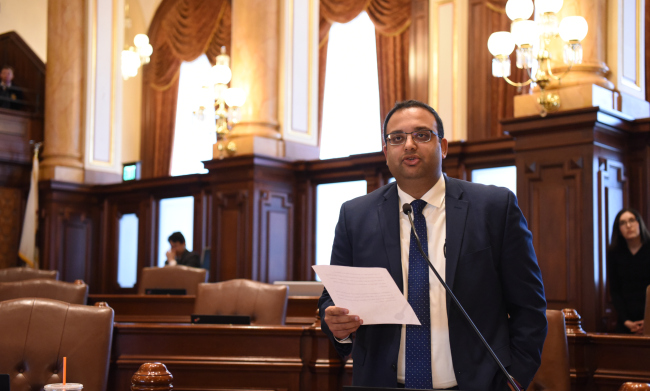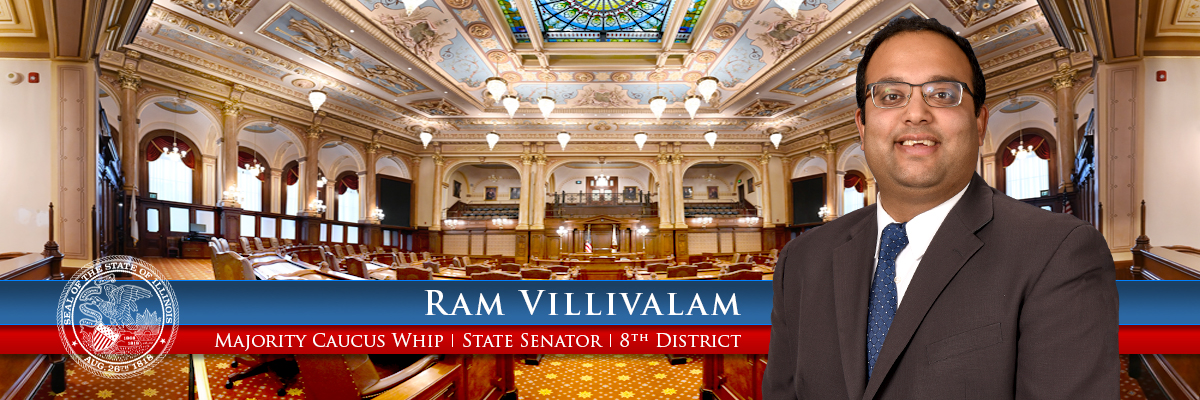- Category: Press Releases
 CHICAGO– State Senator Ram Villivalam (D-Chicago) testified on Monday, May 11 to the Chicago City Council’s Committee on Workforce Development, urging it to support his proposal to enshrine the right to unionize in the Illinois Constitution.
CHICAGO– State Senator Ram Villivalam (D-Chicago) testified on Monday, May 11 to the Chicago City Council’s Committee on Workforce Development, urging it to support his proposal to enshrine the right to unionize in the Illinois Constitution.- Category: Press Releases
- Category: Press Releases
CHICAGO – State Senator Ram Villivalam (D-Chicago) has worked closely with members of the communities he represents to support people in need during the crisis caused by the COVID-19 pandemic.
To date, his office has provided and participated in:
- Calls to more than 100,000 constituents to offer assistance and to answer questions,
- Regular newsletter updates, FAQs, and resource guides with the latest information,
- Wellness check calls made to 6,139 seniors, speaking with 855 of them to connect them to vital federal, state, and local services,
- Assisting on 122 COVID-19 related constituent cases, having resolved 64 of them,
- 59 food pantry/grocery deliveries,
- Creation of a GoFundMe that raised approximately $15,000 in support of local food pantries,
- Coordination of constituent services with other governmental offices and,
- Several online presentations and briefings with fellow local lawmakers and community leaders, including town halls on resources for small businesses, first responders, and schools.
“People need the support of their elected officials more than ever during this unsettling time,” Villivalam said. “I encourage anyone in the 8th District who needs help and/or has suggestions on how we can help to reach out to my office.”
To contact Villivalam and his staff, call (872) 208-5188 or visit his website, www.senatorram.com, to send an email.
- Category: Press Releases
 On Friday, February 7, 2020, State Sen. Ram Villivalam and Dinkar Karumuri, a local Technology entrepreneur and a community leader, met U.S. Sen. Dick Durbin, along with a few immigrant family members from various backgrounds, all of them waiting for more than a decade in the green card approval queue.
On Friday, February 7, 2020, State Sen. Ram Villivalam and Dinkar Karumuri, a local Technology entrepreneur and a community leader, met U.S. Sen. Dick Durbin, along with a few immigrant family members from various backgrounds, all of them waiting for more than a decade in the green card approval queue.
Sen. Durbin took the time to hear their stories and explain the improvements he negotiated to the Fairness for High-Skilled Immigrants Act (S. 386). Dinkar Karumuri thanked the senator for his advocacy and support of immigrants throughout his career in public service, while also indicating the desperate nature of the immigrant community’s situation, that there are several stories to share, and that, at the meeting, they had representatives reflective of the population. Sen. Durbin was interested in hearing the stories.
Tanmayi Achanti, a recent graduate of UIC, explained her plight of having to convert her immigration status to an international student visa during her finals and how aging out hindered the opportunities in her job hunt. “I came here along with my parents in the year 2000, as a 3-year-old kid. Chicago is my home, but I am and feel like an alien in my own home now. I moved to a student visa, and it was devastating for my parents and me. At the same time, we see the job offers get rejected even after I am qualified and for the sole reason of companies not being able to sponsor for my work visa per their policy. I stayed strong to console my parent's pain," she said.
More Articles …
- Villivalam, Barickman introduce tax credit for volunteer firefighters and EMTs
- Villivalam pledges renewed transparency as Chair of Transportation Committee
- Villivalam: Budget proposal bold step forward for education and fiscal stability
- Villivalam to reinstate small business tax credit for creating new jobs
Page 59 of 71





